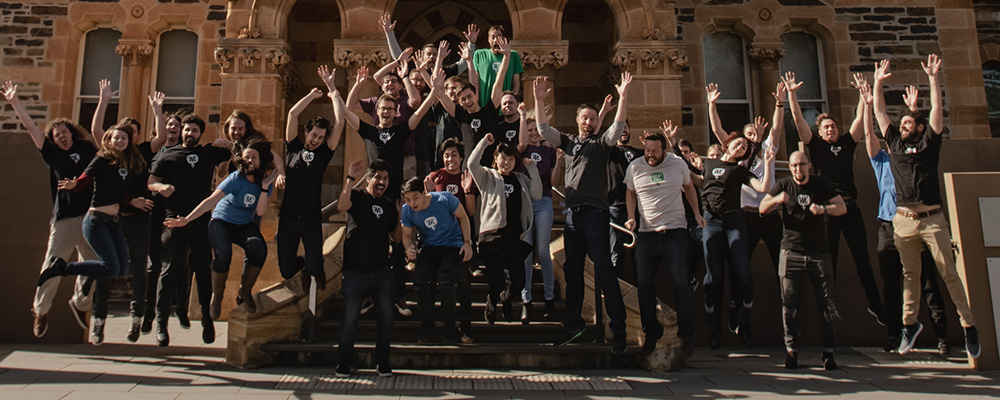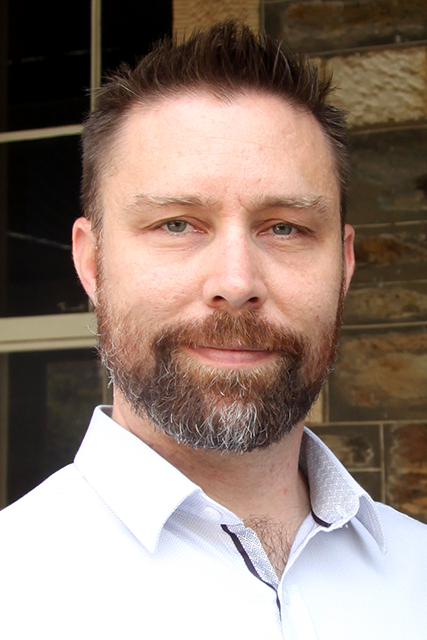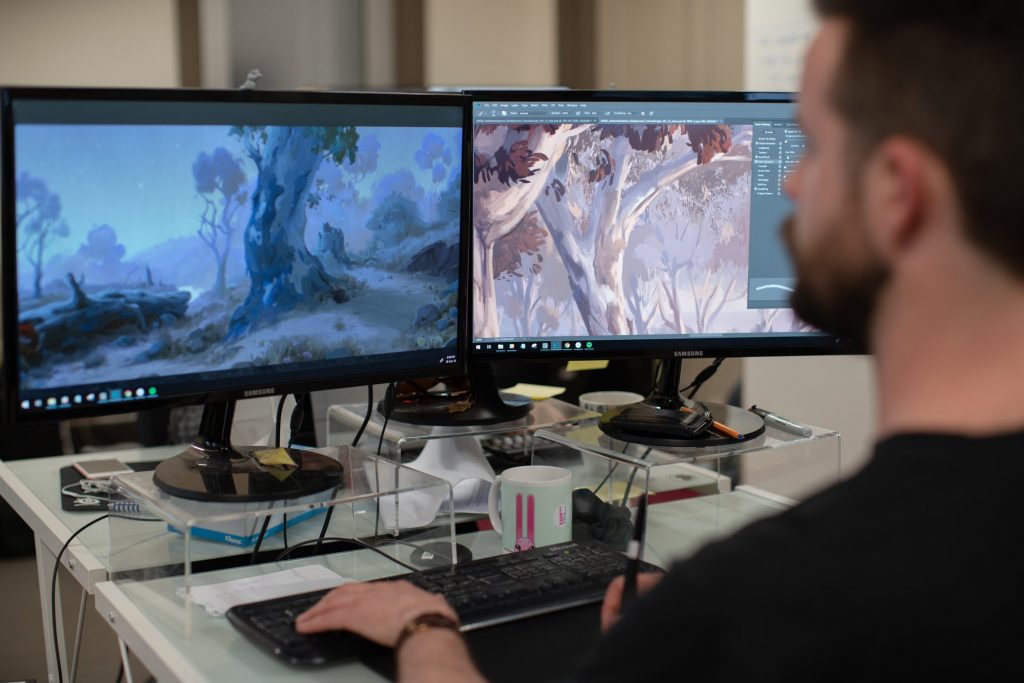WHAT‘S HAPPENING
News & Events
Meet the Adelaide Studios Tenant: Monkeystack
27 August 2020
The SAFC’s Adelaide Studios isn’t just a studio facility, it’s a creative hub that’s home to more than 25 South Australian screen businesses and screen practitioners. In this new series of SAFC interview profiles we invite you to meet the tenants and get to know their work.

When a global pandemic disrupts the screen industry, it’s the disruptors who come out on top.
That’s what Justin Wight, co-founder and director of digital content studio Monkeystack has discovered since COVID-19 began wreaking havoc on the world earlier this year.
He describes his company as a “digital chameleon”, producing content for “any screen, anywhere” – across animation, experience and games.
“We’re pixel merchants. We go from anything from mobile phone screens, VR and AR, right through to cinema screens and projected experiences,” he says.
“At heart we are storytellers, who focus on doing good projects with good people about good things wherever we possibly can.”
Like a chameleon, Monkeystack has adapted to suit changing environments over the 16 years since Wight launched it with co-founders Troy Bellchambers and Shane Bevin, two of his former digital animation teachers.
Back in 2004 the company, which now has a core of 29 staff based at Adelaide Studios in Glenside, was unique in South Australia as an animation and interactive media studio that also worked online – before “online” was even a thing.
“Back then multimedia was the cool thing. Before smartphones and social platforms. Lots of businesses didn’t even have websites back when we started. We were on the cutting edge – we made things for the interwebs!” Wight laughs.
“We were very unique at the time, and it was hard for anyone to really understand what we did. People would say you’re not filmmakers, you’re those guys making games or websites or cartoons or interactive things. We just slipped between the cracks of definition everywhere, all the time.
“As frustrating as it was at the time, because we didn’t fit neatly into any box, in the end that was to our strength, because we were doing something different.”
Monkeystack’s diverse range of skills and talents in the emerging digital sector meant they could operate across many different industry segments – something the company continues to this day.
Now they regularly work with clients locally, nationally and internationally to produce everything from animated series to video games, television commercials, short films, websites – and even a theme park in Qatar, for which the team developed the content gamification strategy and animated series.
“Over the years, we’ve employed specialists in their own fields who are also generalist in everyone else’s, and now instead of being a business that is just animation, or just games, or just experiential, we’ve got three businesses under one Monkeystack umbrella. We have the capacity to produce projects of significant scale without looking to external suppliers” Wight says.
In recent times Monkeystack had been branching out into more “experiential” work – interactive experiences in public spaces, such as the Yabarra – Dreaming in Light immersive light and sound cultural installation which attracted more than 40,000 people at the 2020 Adelaide Fringe and was recently awarded a special merit at the AEAF (Animation Effects Awards and Festival).
Then COVID hit, and put a stop to large scale gatherings. But as it’s done many times before, Monkeystack has managed to adapt, and has come out the other side riding high on a new wave of digital demand.
“The experiential side of our business scaled back, but we found that clients who would normally not have enough time to look at their digital communication strategy have now turned their attention to it. So where one side of the businesses has momentarily slowed down, the other side has really picked up,” Wight says.
“The irony is that some of the planned experientials we had in the pipeline were for clients like museums and art galleries, and now they can’t have their doors wide open and have thousands of people coming in, so they’re looking at how they can deliver experiences. Now everyone’s going, what is this virtual reality thing? What is augmented reality? Budgets are sort of shifting towards the digital space – virtual tourism spaces, virtual experiences, bringing people together in a distanced world. Everyone’s watched everything on Netflix, even the documentaries.
“What I think the pandemic has done is it’s turned people’s awareness to the benefits of digital content production. It’s disrupted the marketplace and it’s forced organisations that have been wedded to their ways of traditional production to look at alternatives, and I think that’s put us more on the radar now.”


But while mass live experiences may be off limits for the foreseeable future, another outcome of the pandemic has been an increase in demand for video games – something Monkeystack is well equipped to deliver.
Later this year the company will see the launch of World War II strategy game War on the Sea, which they are developing in partnership with Adelaide based developers Killerfish Games, as well as a suite of “edutainment” apps for kids under their digital toys brand, EXO PEXO. They’re also continuing work on Trailblazer, one of the first projects to receive SAFC support through the Games Innovation Fund.
Wight believes there are huge opportunities for South Australia’s film and games sectors to overlap and work together even more closely.
“The games industry is growing at an exponential rate – way faster than film and TV. I think filmmakers should be thinking how they can apply their craft in interactive or gamified experiences. Some already are. Films used to turn into games, now games get turned into films,” he says.
“Our business is interesting, because we span that gap between stories told in series and games – and if you look at it, there’s a lot of skill sharing and overlap between those two platforms… and studios like ours sit in the middle.
“So much of the time game developers are caught up in the function of it and the usability of the game, and the story falls by the wayside a bit whereas, filmmakers obviously don’t need to worry about the interactivity of it at all, and they’re only focused on trying to get that emotional response from the audiences.
“If you can make an experience where a person is an active participant as well as being told a great story that they’re emotionally invested in, you’re going to create content that is absolutely world class and in demand. That approach is going to beat a standalone series, film or game because the audience is a participant in the experience – they have agency, they have some control, and they’re emotionally invested. I mean, it doesn’t get stronger than that. It’s the kind of content I want to buy.”
As COVID continues to wreak havoc for film sets and cinemas all over the world, animation for web and TV is also coming to the fore as a type of screen production that’s perfect for a pandemic.
And Monkeystack is perfectly poised to produce it; earlier this month saw the premiere of animated series YOLO Crystal Fantasy on US network Adult Swim, the product of 10 months’ animation work by 10 animators in Monkeystack’s Adelaide Studios office in Glenside.
As the first series ever commissioned by Adult Swim outside the US, Wight says YOLO is a major coup not just for Monkeystack but for South Australia.
“It’s great – I just forget about the uniqueness of it sometimes because we’ve been doing it for so long, but it’s actually quite a special thing for the state and the screen industry,” Wight says.
“I’m really excited about fostering the talent here, and this feels like a really excellent springboard to start attracting work of a similar nature into South Australia. Too often over the last 16 years we’ve had animators come through here that all drift off to the eastern states or overseas and it kills me. But as time goes by, and we get these larger scale productions, I’m feeling more and more confident that we’re going to be able to retain that talent here.”
With skills across all parts of the screen, games and digital sectors, a dense catalogue of work across a range of diverse clients, and an agile and flexible business that almost defies definition, perhaps the best way of explaining Monkeystack’s work is their name, says Wight.
“Have you ever tried to stack monkeys? It’s very challenging.” he laughs.
By Petra Starke
